- Home
- Richard Powers
The Gold Bug Variations Page 8
The Gold Bug Variations Read online
Page 8
Franker spoke of his halted work, his failed scholarly biography, the second night we went out. “The son of a bitch had a bouquet of names. Herri. Henri. Civetta. De Bles. De Dinant. At least two places of birth and half a dozen birthdates. Circa 1500; emphasis on circa. Half the paintings attributed to him probably aren’t his while half of the ones he did paint are probably attributed to somebody else. Not a single signed or attested work. May have been a pupil of Patinir; emphasis on may. May have been his nephew. Christ; I don’t even know if I’m dealing with one guy or three.”
I watched his fingers, strangely entwined. His distress, lovely dressing, was just more flavor for that moment. “His works must be very moving,” I at last said.
“Why do you say that?” At that suspicious snap, the evening changed, modulated into harsher places. Todd’s unkindnesses tore down pathways he himself couldn’t anticipate or steer. I learned that only by stages.
“Well, you wouldn’t spend so much of your life knocking up against those difficulties if they weren’t.”
He laughed, rewarding me for nursing the flame of logic in dark times. He saw me as a faithful Chartres peasant, preserving the cathedral rose in pieces strewn through a thousand wartime cellars. “Sorry to disappoint, Miss. He’s average. Very. Passable panels, in a relatively narrow range. A handful of awkward biblical allegories. Impatient with human figures, dashes them off to justify the scenery. Some compositional interest, slight technical skill, but spiritually mediocre.” He felt silent, the silence of ancient oracles. Finally, speaking to himself under his breath: “But landscape! You ought to see them.” As if every contradiction could be reconciled by jagged, fantastic rose madder.
“If the fellow is as average as you say, why not do somebody more important? Someone you love. Difficult, I have no problem with. But difficult, obscure, and trivial? No wonder you can’t get through with it.”
“Believe me, sweet lady,” Franklin shot back, affecting troubadour. “I’d kill for Brueghel or Vermeer. I’d write on the Mystic Lamb, pour out a book on the singing angels panel alone, if it were still possible. You know how much wood pulp has been sacrificed on the Ghent Altar already? You want the sheepskin, you gotta do Herri met de Bles.”
“Henri,” I corrected. He laughed a compensation, restoring us to other, more pressing theses in need of writing.
I flipped this morning’s postcard over and read the tag on back: Landschap met grote brand. Knowing just enough cognates and etymology to be dangerous, I translated the title without the humiliation of showing my face at the branch within a month of quitting. Landscape with large fire. Only on second look did I notice, true to billing, near the right edge of the pastoral oblivion, something burning. The most delicate umbers and ambers twisted into plumes, shaded to grays, and slipped off into the cloudscape. Fires were, Franker told me, a minor specialty of his apocryphal painter. This one went completely overlooked, even by threatened villagers.
Todd gave no address, natuurlijk. I admired his poise, blowing clear of the wreck, slipping off to Europe the minute his mentor was cremated. The Grand Tour at last, as he always threatened. And making the catch, reaching the far side of the Atlantic, he caps the escapade with a postcard home. No tourist’s trinket vista: that would have been forgivable. The typical Technicolor snap of donjon or belfry might have helped me imagine where he’d run to. But the fool sends a transcription, a reproduction of a painting of an idea of a place, if that.
Nothing would make me happier, even now, than to think that Franklin has at last gotten down to unfinished business, tying up the eternal loose end, spurred by Ressler’s death into at last putting down the ideas he a hundred times explained so lucidly to me in private, in streetlit rooms. But the postcard makes no such claim, no word of the professor or the uses of death. The card says only that he has jumped continent and bought a phrase book. As sympathetic as I am to the scholar’s need to speak in tongues, as much as I share his delight in word acquisition, Flemish would not be the first language Frank has distracted himself with. He invested years in French and German and can at least read Italian, if his pronunciation tends to scumble into sfumato.
He’s told me enough of the scattering of Bles’s panels to suggest that Flanders would only be stop one. To do the job right, he’ll need Vienna, Dresden, Copenhagen, Budapest: excuses to stop and learn Danish and Hungarian. He doesn’t need to read, see, think, or hear another word in any language. He’s memorized all the sources already. He has the damn paper complete in his head, an inch away from written. He’s practically recited it to me. He just has to work up the nerve to declare, “I put my name to all this. Sue me if I’m wrong.” It’s not even conscientiousness that keeps him from the final draft. The real impediment—one as one-folded as seeing—is Franklin’s inability to convince himself that the project has any worth. A year ago, our little band breaking up, I said to him, “At least this is goodbye to distractions. Now you’ll have the time to get back to Herri.” His parting shot: “Why bother?”
He meant to slight more than his panel painter’s technique. He meant the whole, colossal impertinence of studying Art History—the delicate, gessoed, tempera conflagration—in a world setting itself on fire. Franker, in the year I knew him, carried inside, wound up in his love for anachronistic art, a contempt for aesthetics that only the aesthete can feel. Every so many weeks he tried, despite his temperament, to turn himself into a moralist whose ethical code bore one criterion: use. Front-page news—the bleakest of which he clipped obsessively for months—would not allow him to indulge the pointless pleasure he needed. Headlines confirmed his worst suspicion; current events shamed panel and oil. Like an unfaithful lover, he repeatedly swore off sin and allure. But repeated infidelity made the betrayed more beautiful.
What use could new light on a sixteenth-century landscapist be to a sick, self-afflicted present? Dr. Ressler’s terminal nightmare may have decided Franker on that account. His card is cheery enough; he sounds worlds limberer than in the closing weeks of love. But has he really gone to Dinant to write? Could he sincerely believe long-postponed looking might now be of some moral use? New language, any new language—at best, homage to a lost linguist he loved. He’ll never put his new adjectives to the use he wants. Acts of care are never fundamentally useful.
At least he’s made the pretense of getting down to work. I, on the other hand, entering unemployment’s third week, have done nothing for days but add up my liquid assets and divide them by my spending rate, determining how much time I have before I run my life savings into the ground. Depending on the weight I assign the variables, I’m left with between forty and sixty weeks. Less than nothing and more time than I know how to fill. Weirdly exhilarating prospect: I give this week a number and begin the countdown. Week zero, getting closer every seven days, ought to put an edge on my style. Make me more supple than I’ve been in a while. But supple for what? Having nothing better to do, finding guilty delight in the pure, useless exercise of powers, I spent two hours this afternoon placing the allusion in Franker’s card. The accents and alliterations gave me a broad hint where to begin. I worked in the sunny pleasure of my own room, combing the volumes that have grown over the years, reproducing themselves into a private reference collection. I worked—the oddest of feelings—for myself alone. No one to solve the citation for but me.
The line showed up in an Anglo-Saxon poem, one of the earliest in the language that mutated into English. A fragment in the Exeter Book called the Husband’s Message. He closed with it as friendly challenge, for old times’ sake: from a vanished friend to one left behind. Invigorating, to learn a language. Aside from that citation hunting, nothing. Dinner, extravagantly, at a sit-down place near Prospect Park, savoring spice and irony, paying for both with two days’ worth of remaining time. The passage of time with nothing specific to accomplish makes me feel a little more blessedly, acutely free. I eat, I walk fearless in the summer air back home. I sit alone in my room, among the home reference. I
now have all a lady is allowed had I only an answer. Had I only him.
IMITATION OF THE DANCE
If the forties’ great debate raged over which macromolecule carried hereditary material, and if the early fifties fought over nucleic acid structure, Ressler walks smack into the contention of 1957 on his first day in the lab. Conscientious hygiene resulting from a working relationship with microorganisms made him bathe this morning before leaving barracks. A regular dawn dunking also gives him time for undirected reflection. Like Luther, his best insights arrive in proximity to porcelain. But drying his hair before setting off is time lost to superfluity. The omission puts him into the scientific cross hairs.
While he unpacks his glassware and sets up a cot in a storage room, Jeanette Koss, the woman at Ulrich’s party steeped in world polemics, passes his counter and puts a discreet hand on his. The contact startles Stuart; her touch, real skin rubbing the fur of his arm, cuts—so long has he been without—like an accusation. Dr. Koss whispers, “If Blake or Lovering catches sight of you in this condition, your year is ruined.”
In the same soft confidence, she lays out that Joe Lovering, her soiree spar partner, and Tooney Blake, the pianist of less than gershwinning ways, are locked in an ideological conflict about the hazards of going outside with a wet head. The two scientists share compatible lab practices and commensurate views on the coding problem. But on this matter, they are bitterly bipolar. Dr. Koss relates how Blake has devoted himself to a systematic destruction of the old wives’ hypothesis linking wet hair to open virus season. For the last month he has immersed his head twice daily, once before setting off to work and once before leaving the lab. “Just a hairsbreadth,” Dr. Koss confides, “between empiric physiology and abnormal psych.” Lovering, on the other hand, in horrified reaction, not only maintains bone-dry hair at all times but even now, in late July, keeps up a steady regimen of preventive tonics. “You see,” Koss explains, releasing him from her touch, “they have no experimental control. If they catch you like this, you’re It.”
He’s walked into all-out inimical politics. To date, he’s lain low in the exchange between lab partners Niki and Ike. But his colleagues in deciphering have brought the Cold War home. Best avoid getting caught in the draft. Ressler thanks Dr. Koss for the caveat, but that’s not sufficient. She produces a supply-room towel and insists on helping him. She wraps his head in the fabric and before he collects presence of mind to object begins rubbing him gently but briskly, businesslike, from crown to nape of neck. Buried memory shoots up through scalp: his mother preparing him for church, a wedding or funeral. The wince of somatic recall—thumb moistened with saliva, rubbing raw the skin behind his ears. The woman pinches his head into sweet pain. Woytowich walks in, salutes abstractedly, not even blinking.
Koss smoothes back his hair, combs it, smiles, and crosses the room to resume her work with the vernier scales. There she carefully measures the thickness of near-invisible growing media. In a minute, nothing out of the ordinary has happened; in two, Ressler’s skin forgets the contact. He’ll have to make allowances for the woman in the lab. Female scientists are still rare enough to seem as anomalous as Dr. Skinner’s Ping-Pong-playing pigeons. Cyfer’s employing two is a statistical violation. Toveh Botkin, the team’s senior member after Ulrich, possesses an antique, clinical grace that sweeps her into the province of competent sexlessness. At the welcome party, he took to the older woman and refused all but a weak smile at the lone flash of humor to come from the evening: Joe Lovering describing her life as a series of near Mrs. Dr. Koss, on the other hand, a certified Mrs. in her spare time, is not to be completely trusted. Young, still breeding-age, somewhat better looking than germ culture: might upset the pheromone levels around here from now through the end of summer.
Yet this first afternoon, there seems little to worry about on that score. Blake, by his pianistic skills, is prematurely male-menopausal, Dan Woytowich too B-complex-deficient, and Ulrich too intent on cash-raising to raise any more disruptive fund drives. That leaves Lovering, who, by the time Stuart finishes unpacking, has taken up a post by a caged pair of white lab rats, apparently more mascots than experimental animals. Crew-cut, glasses, starched white coat with nub tie underneath, Joe shouts, “Mate, you suckers.” Lovering’s safe too.
The lab is well equipped. The experimental world divides into steriles and breeders. Stuart did his graduate work under a breeder, a brilliant teacher whose workplace’s itinerant confusion—proliferating notebooks, apparatus, scopes, and racks of flasks whose labels had soaked into illegibility—was acute torture. Ulrich, happily enough, is a sterile. Never have supply cabinets so closely mimicked the pictures in warehouse catalogs, and the entire team, from post-doc Koss through veteran Botkin, keep their rubber-glove boxes prominently displayed.
The steriler the riper for Ressler. The only antidote to what ubiquitous radio announcers call the aches and pains of today’s modern living is hair of the dog: research alone will cure a world sick on the aftereffects of discovery. Empiricism is the only way from ovum to novum. The panacea he has in mind requires only a lens with focal length long enough and a sterile place to stand.
Ulrich’s note was accurate; the lab is between measurements at the moment. The day Ressler arrives the group is on extended leave from titrations, stains, and partition chromatography. They are after a transcription axiom, linguistic. For the rule linking nucleotide sequences to protein synthesis to be determined experimentally, Cyfer must first play with its shape, its inner symmetries. They are up against not so much the chemistry of biology as the math. Molecular genetics, stringing the fine line between experimental and theoretic, has a first shot at bridging the gap, grounding organic complexity in fundamental arithmetic. Ulrich has called a moratorium to consolidate the lightning results of recent months and formalize Cyfer’s understanding of the symbolic logic that genetics has stumbled on. First vocabulary; then the generative grammar. Time for pure speculation. No more cigar butts, fingerprints: just, as the Belgian says, the little gray cells. Ressler’s first day at school is a day to indulge in that old sworn enemy of experiment: reason.
The team was originally called the Ulrich Group, but that was impossible to say without coming to a full stop between words, which no one since Chargaff has had time for. The year before Ressler arrived, the team was rechristened the Enzyme Synthesis Identification Group. But that broke the unwritten rule of acronyms. At last Tooney Blake hit upon Cyfer, a compression of Cytology Ferment. While they weren’t strictly in the wine business, the name was the catchiest in the hard sciences since Bill Haley and the Comets. The sobriquet even gives them an edge with grants.
A strange brew of personalities the name stands for. Toveh Botkin bicycles up on a machine that might have taken her on annual prewar pilgrimages to Bayreuth. Tooney Blake enters, abstractedly patting every empty pocket on his person. Karl Ulrich pulls into the Biology Building parking lot in a VW bearing the plate e coli. Ressler has nothing against this bundle of bacterial joy so long as it stays in the intestines. But why dirty one’s hands in the buggers when the problem of pure coding is at stake? All present and accounted for, Ressler joins his maiden Blue Sky session. The informal brainstorming gets underway, everyone tossing out abstracts of articles and volunteering to review others for the following week. Soon talk wanders onto topics that leave them sounding more like a clutch of cabalists or college of cardinals.
From their predecessors—pylons in the vast, incomplete suspension bridge between the inanimate atom and the world ecoweb—Cyfer inherits a list of numbers it must arrange into a magic square. They work with an alphabet of four nucleotide letters. These, if grouped as commonly believed into trinities of nucleotides, produce a vocabulary of sixty-four different words. These three-letter words translate into immense miracle-sentences in a language of twenty amino acid actants. Cyfer brainstorms, trying to weld together these incunabula into a grand, new gnosticism.
In this free association, they run the gamu
t of human failing. Joe Lovering races in minutes from embracing the newest fad on punctuation to discarding it wholesale in favor of a newer, improved flier. Dan Woytowich remains, incredibly, the last of the old guard to refuse to embrace the Watson-Crick model. His every static-sparking comment rejects the helical staircase. He declares, in a folksy singsong tailored to get on everyone’s nerves, “Too simple to be all there is.” Whenever anyone says anything remotely lucid or steers the group toward something they might at last get started on, Woyty shakes his head sadly and says, “We’re overlooking something here. We’re talking the big L, after all.”
Ulrich is a bright spot in the painful group grope toward microunderstanding. Cyfer’s leader runs the session as a benevolent dictator, neither encouraging nor condescending to his charges. He follows the time-tested policy: let intellect propose and measurement dispose. He fills the chalkboard with A’s, T’s, G’s, C’s, unzipping helices, decoding boxes, templates, diamonds, triangles, every model short of hex signs. He mutters out loud from time to time, as do the rest of the team. But Ulrich’s mutterings hold the floor. The part of Ulrich’s presentation that most captivates Ressler is not molecular, but rhetorical. To one beautiful scheme that reveals a flaw, rolls belly-up against experimental evidence, the chief pronounces stoically, “So goes poetry. Shipwrecked on shoals of fact.”
Ulrich possesses that critical leadership skill in the age of Big Science: the ability to inspire others to work with devotion. Members compete to win the next stroke of praise. Ulrich makes them each sense that all of their names will appear on the resulting paper. Still, Ressler declines to put forth his private bias on how to begin cracking the coding problem. Reticence is not an issue, nor fear of bruised ego. In his freshman session at the public trading post, the small crystal of clarity he now possesses might get lost in the hypothesizing pandemonium. In a few weeks, after he learns the ropes, he’ll lay out his vein, the method so new that he himself can’t formulate it yet.

 The Overstory
The Overstory Bewilderment
Bewilderment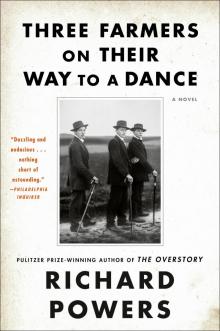 Three Farmers on Their Way to a Dance
Three Farmers on Their Way to a Dance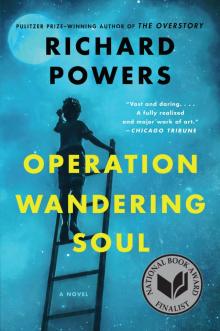 Operation Wandering Soul
Operation Wandering Soul Prisoner's Dilemma
Prisoner's Dilemma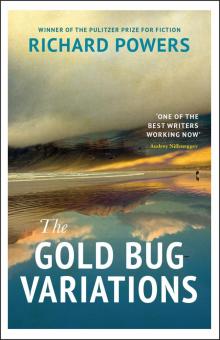 The Gold Bug Variations
The Gold Bug Variations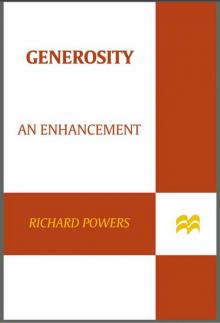 Generosity: An Enhancement
Generosity: An Enhancement The Echo Maker
The Echo Maker Orfeo
Orfeo The Time of Our Singing
The Time of Our Singing PLOWING THE DARK
PLOWING THE DARK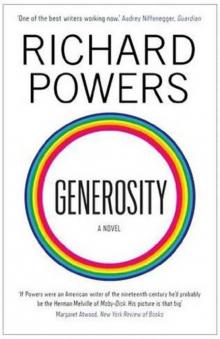 Generosity
Generosity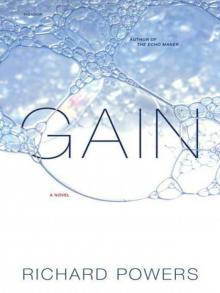 Gain
Gain